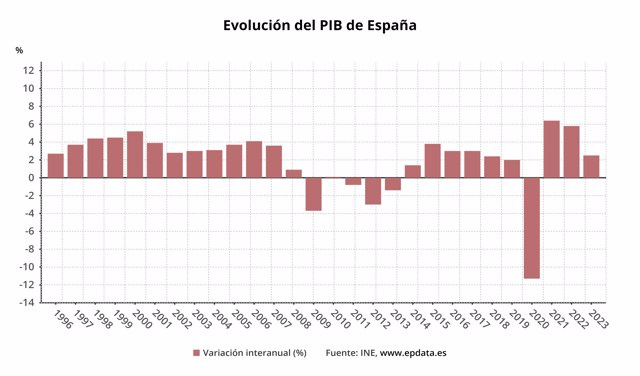The interannual GDP of the 4th quarter increases its growth by one tenth, up to 2%, driven by household consumption and investment
The Spanish economy grew by 2.5% in 2023, one tenth more than expected by the Government, after recording a quarterly rebound of 0.6% in the last quarter of the year, two tenths more than in the previous quarter and its highest quarterly increase since the second quarter of 2022, according to the advance of National Accounting data published this Tuesday by the National Institute of Statistics (INE).
In this way, the Spanish economy achieved its third consecutive annual growth in 2023, although last year's growth was the most moderate of said period: in 2021 the GDP increased by 6.4%, in 2022 it grew by 5.8% and It has now softened its boost to 2.5%, a rate 3.3 points lower than the previous year.
These three years of growth have occurred after the historic decline in GDP of 11.2% caused by the outbreak of the coronavirus.
National demand contributed 1.7 points to GDP growth in 2023, 1.2 points lower than in 2022, while external demand contributed eight tenths, 2.8 points below the previous year.
GDP at current prices stood at 1,462,070 million euros in 2023, 8.6% more than in 2022. In the fourth quarter of 2023, it reached 375,161 million euros, a figure 10,345 million euros higher than that of the preceding quarter and the highest in the historical series.
According to INE data, investment advanced 0.6% in 2023, thus marking its third consecutive positive year. However, this rate is 1.8 points lower than that of 2022, when investment grew by 2.6%, and is also below the 2.8% of 2021.
By economic sectors, services grew by 3.2% in 2023, above the 1.9% advances in construction and industry. In contrast, agriculture was the only sector with a negative gross value added, -2%.
The INE data published this Tuesday incorporates different revisions that affect previous quarters. Thus, the quarterly growth for the third and second quarters of 2023 has been revised upward by one tenth, to 0.4% and 0.5%, respectively.
It has also increased the interannual growth of the third quarter of 2023 by one tenth, to 1.9%, and has lowered the quarterly GDP growth of the first quarter of last year by one tenth, to 0.5%.
GDP ACCELERATES ITS INTER-ANNUAL GROWTH TO 2%
In an interannual rate, GDP in the fourth quarter grew by 2%, which is one tenth more than in the previous quarter (1.9% after its upward revision by one tenth). In this way, the Spanish economy has recorded 11 consecutive quarters of year-on-year progress.
The year-on-year GDP growth was the result exclusively of the contribution of domestic demand (2.1 points), its highest contribution since the third quarter of 2022, since the foreign sector presented a slightly negative contribution.
Household consumption accelerated its year-on-year growth by almost two points in the fourth quarter of 2023, to 2.4%, while public spending increased by 4.4%, two tenths less. Investment, for its part, returned to positive rates and advanced 1.6%, compared to the 0.1% decline in the previous quarter.
Exports and imports also recovered positive rates after growing 1.2% and 1.7%, in contrast to the falls of 1.1% and 2.5% in the previous quarter.
HOUSEHOLD CONSUMPTION MODERATES IN THE FINAL STRAIGHT OF THE YEAR
In the final stretch of 2023, GDP grew by 0.6%, two tenths more than in the third quarter. Household consumption increased by 0.3% between October and December, moderating by nine tenths the increase it had experienced in the previous quarter. In this sense, the INE has reduced household consumption by between two and three tenths for the first three quarters of 2023.
In parallel with the moderation in household consumption, public spending maintained its quarterly growth at 1.4%, unlike investment, which expanded its contraction by 1.3 points, to -2%, its largest quarterly decline from the fourth quarter of 2022.
For their part, after two negative quarters, exports and imports advanced by 2.9% and 2.7% in the last quarter of 2023.
Employment in the economy, in terms of hours worked, increased by 0.7% in the fourth quarter compared to the previous quarter, seven tenths more than in the previous quarter. In year-on-year terms, the number of hours actually worked increased its growth by nine tenths, up to 2.8%.
For their part, full-time equivalent positions increased by 3.9% year-on-year, their largest year-on-year increase since the second quarter of 2022 and six tenths above the rate of the previous quarter.
Productivity per hour actually worked fell by 0.1% year-on-year in the last quarter of 2023, compared to growth of 0.4% in the previous quarter. Productivity per full-time equivalent job also contracted 0.1% year-on-year, moderating the decline in the previous quarter (-1.7%).
The total remuneration of employees increased by 8.5% year-on-year in the fourth quarter of 2023, four tenths less than in the previous quarter, while average remuneration increased by 4.4%. For its part, the gross operating surplus increased by 2.4% year-on-year, compared to 6.3% in the previous quarter. It is the lowest rate since the first quarter of 2021.
The GDP deflator increased 5% year-on-year in the final stretch of last year, a rate 1.1 points lower than that of the third quarter. The quarter-on-quarter rate increased by 2.2%.
ASSESSMENT OF THE MINISTER OF ECONOMY: "ALL EXPECTATIONS ARE EXCEEDED"
The Minister of Economy, Commerce and Business, Carlos Body, has highlighted that the 2.5% growth of the Spanish economy in 2023 "exceeds all expectations."
"In the last quarter, the pulse of our economy was maintained with a growth of 0.6% compared to the previous quarter and this is very important because it places us at an advantageous starting point to be able to meet our 2% objective in 2024," the head of the Economy stated in an assessment sent to the media.
Body has detailed that the main drivers of the economy have been private consumption, thanks to the "good evolution" of the purchasing power of households, and "the good performance of the labor market, with the creation of 780,000 jobs in 2023 ".













